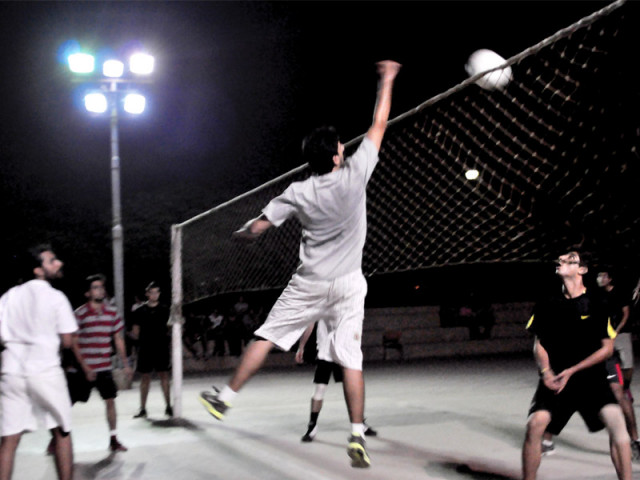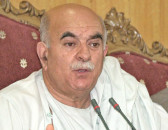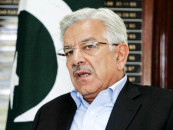Modern-day Persian warriors battle it out over traditional Ramazan matches
Matches have been taking place every Ramazan since 1966 at the Cyrus Minwala Colony Hall.

Come Ramazan and Parsis in Karachi gear up for a volleyball face-off which is not just a 46-year-old sports tradition, but a highly competitive one.
“Saying that the teams get competitive would be an understatement!” says Yashaan Mavalvala, who participated every year in the inter-colony volleyball tournament from 1998 till 2009, before leaving for his studies. “Every Ramazan, all the Parsis come together and almost kill each other out in the court during the tournament.”
Good humoured teasing, sometimes acidic, sometimes expletive-riddled, volleys forth over the court as the jibes are exchanged over who will win. “It’s awesome!” This Ramazan, six Parsi teams will participate in an inter-colony volleyball tournament. The tournament has been taking place every Ramazan, due to suitable work timings, at the Cyrus Minwala Colony Hall since 1966. This year, around 45 matches will be played which will begin at 6:30pm every day.
The matches are held on a floodlit court, surrounded by energetic fans in the stands. Participating colonies include the Anjumanbagh Colony and archrivals Cyrus Colony and Avari Colony. Due to the declining Parsi population in Karachi, three inter-colony teams that consist of a mix of players from different colonies, have also been created: Badboyz, Thrill Seekers, and the Persian Fighters.
Trend through the ages
Volleyball has been a prominent sport in the Parsi community, mostly due to its popularity at the Bai Virbaijee Sopariwala Parsi High School (BVS). “It is easy to play, doesn’t require much equipment, and there is no formal dress code. Just a small court and a ball,” explains a BVS alumnus with reference to the sport’s popularity in the school.
In 1993, the mud-court at the Cyrus Minwala Colony Hall was replaced with a concrete court for safety purposes. Before this, only two players played on each side according to standard beach volleyball rules. Today, between six to nine players represent each team on the court. There is also a junior volleyball tournament for the younger representatives of the community and a throw ball tournament for women. The winners of the tournaments are awarded trophies.
The love for volleyball has been passed down from generation to generation in the community with Parsi boys playing the sport from a young age. “I’ve always said volleyball is in our blood! We grew up with it and watched everybody fight for the cup. It is intense and amazing,” says Mavalvala who started going to the courts when just six-years-old. He would help Varun Mody practice his volleys in turn for lessons in serving.
Another enthusiast, 18-year-old Afshad Wania, started playing volleyball at the age of five and has been representing the Avari Colony in the tournament for the last seven years. He says his father plays the sport and always encouraged his sons to play as well. The tournament holds a lot of significance for Afshad, who says “most of us wait for it every year”.
Afshad’s elder brother, Kaezad, also started playing in the tournament when he was nine-years-old but can no longer participate as he is abroad for his studies. “I hate missing the tournament,” admits Kaezad.
Low turnout, high spirits
The teams are reducing in number each year, as is the crowd. “Back in 2009, we used to have 12 or 13 senior teams but these days we are lucky to get around six or seven,” says Mavalvala.
Veera Rustomji describes the tournament as “a bizarre Parsi ritual”. “It used to be a really big thing where everyone would go with snacks and posters. But now, everyone has left the country so it has fizzled out.” Despite the fizzling out, the tournament still draws in a large crowd of about 60 people, who add to the entertainment factor of the tournament with their colorful cheers. Food is sold at the hall, which is always a selling point. About 150 people attend the final matches and according to Mavalvala, the crowd goes wild.
Published in The Express Tribune, July 28th, 2012.



















COMMENTS
Comments are moderated and generally will be posted if they are on-topic and not abusive.
For more information, please see our Comments FAQ